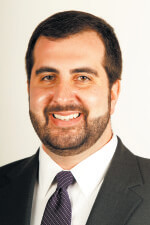By: Mark Soticheck
I remember the specific class in which I made the decision to pursue accounting. The decision was based almost entirely on two things: (1) I was actually getting an ‘A’ in my Intro Accounting class; and (2) it sounded cool to think I might have the opportunity to work on a project that was covered by the Wall Street Journal. Oh the impetuous mind and rationale of an 18-year old!
Fast forward a few years and I began my career in public accounting—as many CPAs do—in the wonderful world of tax consulting, followed by assurance services. Every CPA I ran into was a sole practitioner, vice president of tax, controller, chief accounting officer, or chief financial officer. I figured I would either end up being a partner in my firm or in one of these other capacities. Oh the limited visions of a 25-year old.
While in public accounting, I began to volunteer with NCACPA for myriad of reasons including community involvement, networking, and leadership opportunities. I have held various positions and had the privilege and pleasure of befriending several amazing individuals. My skills have come in handy when trying to teach someone less fortunate how to balance a checkbook or manage their finances, teach economics to sixth graders, or financial management to high school students. I have met CPAs who are attorneys, professors, consultants in various fields across every possible industry, talented individuals working at nonprofit organizations, leaders in professional organizations, churches, and the community. At 30-years old I have surely seen it all, right?
In the past few years, I’ve expanded my visions even more through new/different leadership positions, new roles in my professional career, and attuning myself to what was happening in my community, state, and country. I’ve now met CPAs who are presidents and chief executive officers of companies, entrepreneurs, and men and women that serve as representatives at the state or national level. What else can a CPA do?
When I turned 32-years old, I unexpectedly veered drastically off course from my original plans. I was offered a position as chief operating officer for a community bank. Besides testing controls, what does a CPA know about operations? I have quickly concluded two new lessons: (1) always continue to learn and observe, because you never know what you will find next; and (2) a CPA can do anything!
One of the most desirable and rare qualities of a CPA is the way we process and analyze information far beyond that of what’s on a tax return or in a set of financial statements. We always approach situations wondering “what’s behind the curtain?” or “where’s the risk in that?” Also, CPAs are typically well-educated and driven—both professionally and personally. Many of us that are fortunate enough to have grown up in a public accounting firm are very process-driven already, working almost continuously under a sense of urgency. We also spend time honing “an executive presence” in front of our staff, superiors, clients, Boards of Directors, and the public, as we are always expected to keep a calm and confident demeanor. Lastly, CPAs routinely deal with different clients, challenges, and teams, all of which helps us adapt more quickly to whatever new situation we encounter.
Maybe my initial rationale for wanting to go into accounting was not as sound as it could, or should have been, but it has taken me on a ride more interesting and far more rewarding than I ever imagined when sitting in my introductory accounting class. One thing is for sure, the possibilities of a CPA are endless…
 After beginning spending the first 10 years of his career in public accounting, the majority of which was spent with Dixon Hughes Goodman in the Raleigh office as part of their financial institution services group, Mark Soticheck has transitioned into private industry. In August 2013, Mark joined one his long-time clients, Fidelity Bank headquartered in Fuquay-Varina, NC, as Chief Operating Officer and Senior Vice President. Currently, Mark oversees the Bank’s deposit and loan operations, information technology, cash management and project management departments.
After beginning spending the first 10 years of his career in public accounting, the majority of which was spent with Dixon Hughes Goodman in the Raleigh office as part of their financial institution services group, Mark Soticheck has transitioned into private industry. In August 2013, Mark joined one his long-time clients, Fidelity Bank headquartered in Fuquay-Varina, NC, as Chief Operating Officer and Senior Vice President. Currently, Mark oversees the Bank’s deposit and loan operations, information technology, cash management and project management departments.
Mark is currently serving on the AICPA Council as one of the representatives from North Carolina, and he will also begin his term as Treasurer of the NCACPA in May 2014. Mark is a former member of the NCACPA’s Board of Directors, as well as a Young CPA Cabinet member and former chair of the NCACPA’s Financial Literacy Council. Mark will begin his term as Treasurer of the NCACPA in May 2014. Separately, Mark is currently serving on the Board of Directors, as well as Treasurer and chair of the Finance and Investment Committee for Triangle Land Conservancy.
Mark received his Bachelor of Science in accounting from Florida State University and his Master’s of Accounting from Florida State University.